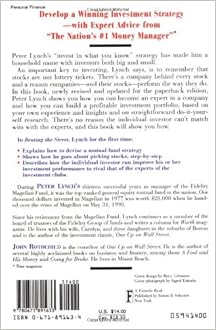From Publishers Weekly
Until retiring in 1990, Lynch ( One Up on Wall Street ) was manager of the spectacularly successful Fidelity Magellan Fund. Here he recalls with self-deprecating humor and disarming candor how he went about choosing winning stocks (and missing a few) for the $12 billion fund, which, during one five-year period in the 1980s, earned investors a 300% return. Lynch strongly favors stocks over other investment vehicles but insists that "investigative" research into a corporation's prospects, including credit checks and visits to the firm's installations, is essential. "Focus on companies, not the stocks," he stresses, adding that on this basis limited partnerships, banks and even S & Ls can be sound investments. Lynch's reputation and business writer Rothchild's deft touch should yield big sales for this inside story. Major ad/promo; first serial to Money magazine; BOMC and Fortune Book Club alternates; author tour.
Copyright 1993 Reed Business Information, Inc.
--This text refers to an out of print or unavailable edition of this title.
From Library Journal
Lynch is the master stock picker who led Magellan (until May 1990) to its position as America's biggest mutual fund. In One Up on Wall Street (Simon & Schuster, 1989), also written with Rothchild, he described his winning methods. Here, he provides a few more elaborations and 21 "Peter's principles." Some are overly clever, e.g., being first in line is a great idea except on the edge of a cliff. Lynch takes three chapters to explain how he "done it good" at Magellan. One valuable chapter details methods for picking a mutual fund from the thousands available, but most of the book is devoted to demonstrating his research into picking the 21 stocks he recommended in the January 1992 Barron's roundtable. Still, since the average investor will not get to talk to the CEO or visit the company in person, maybe we should all just buy Lynch's recommendations each year. A tossup. Previewed in Prepub Alert, LJ 11/1/92.
- Alex Wenner, Indiana Univ. Libs., BloomingtonCopyright 1993 Reed Business Information, Inc.
--This text refers to an out of print or unavailable edition of this title.







